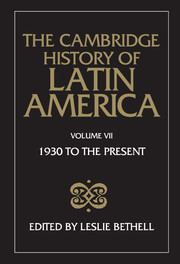5 - El Salvador since 1930
from PART TWO - CENTRAL AMERICA
Published online by Cambridge University Press: 28 March 2008
Summary
During the first three decades of the twentieth century the economy of El Salvador became the most dynamic in Central America. Unlike the rest of the region, El Salvador had no banana enclave, but the success of its coffee economy was such that the country gained a reputation as ‘the Ruhr of Central America’. The efficiency of the coffee sector owed a great deal to the capacity of a new generation of landlords to exploit the comprehensive alienation of communal lands in El Salvador's central zone in the years which had followed the Liberal revolution of 1871. The altitude and fertility of these lands was particularly well suited to the crop, and because El Salvador is by far the smallest Central American state (21,040 square kilometers) while possessing a large population – even in 1930 it was approaching 1.5 million – the density of settlement was extremely high and the opportunities for peasant migration correspondingly low. As a result, large numbers of rural inhabitants were not so much physically displaced as deprived of their status as small freeholders or members of the municipal commune and converted into waged harvest labourers or colonos paying labour rent for subsistence plots on the edges of the new coffee fincas. Thus the Salvadorean agro-export sector was unique in the isthmus in that it was blessed with a high availability of local labour. Moreover, the remarkably rapid and all-encompassing alienation of common land – the Church, that other traditional target of nineteenth-century liberalism, possessed very little rural property – encouraged an early concentration of commercial estates and propelled the formation of one of the most compact and confident landed oligarchies in the world.
- Type
- Chapter
- Information
- The Cambridge History of Latin America , pp. 251 - 282Publisher: Cambridge University PressPrint publication year: 1990



